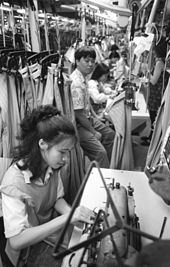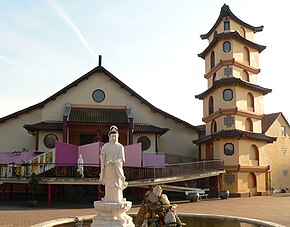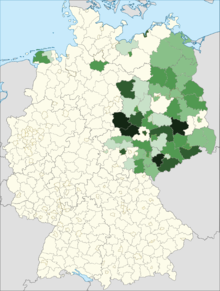Vietnamese in Germany
The Vietnamese in Germany (also German Vietnamese , vietnam . Người Việt tại Đức ) are a numerically small group of immigrants in the Federal Republic.
overview
At the end of 2009 there were almost 85,000 Vietnamese citizens living in Germany. In addition, there are the numerically not exactly known groups who have accepted German citizenship and those who are illegally staying in Germany. It is assumed that there are around 100,000 to 125,000 people of Vietnamese descent in Germany. The number of Vietnamese who have acquired German citizenship is estimated at over 40,000.
The Vietnamese community in Germany is not isolated, but is closely linked to the Vietnamese in the Czech Republic and Poland through European internal migration . The main reason for this is the German return policy in the 1990s, as part of which many Vietnamese moved to the Czech Republic and Poland.
During the riots in Hoyerswerda (1991) and the riots in Rostock-Lichtenhagen (1992) Vietnamese living in Germany became victims of right-wing extremist violence.
history
Vietnamese in the old Federal Republic of Germany

Larger groups of Vietnamese immigrants came to the FRG from the 1970s , when the German government had agreed to accept Vietnamese refugees (including many boat people ) following the first Indochina refugee conference of the United Nations High Commissioner for Refugees (UNHCR) in July 1979 . The quota for refugees was gradually increased to around 38,000 people. Several hundred Vietnamese children (mostly war orphans) were also adopted by West German families.
Vietnamese in the GDR
In the 1950s, students from North Vietnam were invited to colleges and universities in the GDR through a friendship treaty . You could acquire a diploma or a doctorate here . A permanent stay in the GDR, however, was not planned, as a special measure the students had to return to Vietnam about one to two years before graduation, where they got married and had children. Only then were they allowed to take the final exams at the educational institutions. In doing so, the Vietnamese government ensured that skilled workers would remain in their country.
In the early 1970s, the GDR government concluded agreements with the socialist brother countries Vietnam, Poland, Hungary and Mozambique on the use of workers from the above-mentioned countries to secure the domestic economy with workers.


The mostly unskilled workers arriving in groups were given their own quarters in the GDR districts; A complete residential area was built in Berlin-Lichtenberg on Rhinstrasse, in Berlin-Marzahn the new dormitory was ready in Rabensteiner Strasse, in Rostock the district of Rostock-Lichtenhagen grew and the contract workers also got their own residential quarters in the southern districts . They attended German courses in the cities, but were also able to train as skilled workers. A kind of shadow economy established itself in the residential districts , because business-minded Vietnamese produced sought-after jeans or other items of clothing that were scarce in the normal range of the GDR and thus earned considerable extra income.
After the end of the Vietnam War, the reunification of North and South Vietnam and the establishment of the Socialist Republic of Vietnam , people from all over Vietnam were finally invited to the GDR, which at the time was considered a particularly progressive socialist state.
By 1989, more than 100,000 Vietnamese had studied, lived or worked permanently or temporarily in the GDR, especially in East Berlin , Rostock, Erfurt , Jena , Karl-Marx-Stadt (Chemnitz), Leipzig and Dresden . At the same time, the number of Vietnamese permanently living in the GDR reached almost 60,000. Up to this point in time, between 30,000 and 40,000 people from Vietnam had also immigrated to West Germany .
After German reunification
From 1990 the number of people without work in the newly founded East German federal states rose rapidly, including many Vietnamese contract workers. A larger group of people returned to Vietnam, either entirely voluntarily or with the help of a small compensation paid by the respective company.
Unemployment was high among the people who remained in Germany, so they looked for other ways to earn a living. They became largely self-employed, often with small flower shops or services such as sewing or washing. The illegal sale of cigarettes cheaply produced abroad also turned out to be lucrative, but also repeatedly led to a kind of gang war for the best locations.
There was discrimination between some Germans and the former contract workers, which culminated in the riots in Rostock-Lichtenhagen. Although the federal government had offered the Vietnamese living in East Germany to cover the costs of a return trip to their homeland, the majority of them decided to stay. Immigration from Vietnam to Germany continued even after reunification. Now they no longer stayed in their residential areas, but looked for their own apartments and worked fully towards their integration . In the 2010s, Vietnamese are often described as one of the best-integrated immigrant groups in Germany. For years Vietnam has also been one of the ten countries with the highest number of asylum seekers in Germany. Many of them value a good education; Children from Vietnamese families are often very good students.
Larger Vietnamese communities can be found in Munich and Hanover as well as in the former East Germany .
Statistical evaluations of global cash transfers have recently shown a turning point between Vietnam and Germany. Vietnamese people now living in Germany and their descendants even benefit from donations from their old homeland due to the economic development there as a result of the support they previously provided to their relatives.
Vietnamese in Berlin
Vietnamese people are the largest Southeast Asian community in Berlin and make up 1.16 percent of the city's population. Areas with a significant proportion of the population are primarily the districts of Lichtenberg and Marzahn-Hellersdorf , where at least 3,800 people of Vietnamese origin live.
A total of 12,814 of them were born in Vietnam and have Vietnamese citizenship (as of 2009), 20,000 have German citizenship or were born in Berlin; there are also unknown numbers of illegal immigrants, often from rural areas. The total is 20,000 (0.6 percent of the total population).
The Reistrommel association was founded to help and support the Berlin Vietnamese .
Well-known people of Vietnamese descent in Germany
- Mai Duong Kieu (born 1987), actress
- Kien Nghi Ha (* 1972), author and political scientist
- Hàn Thế Thành (* 1972), computer scientist
- Pham Thi Hoai (* 1960), author
- Chi Le (* 1987), actress
- Yung Ngo (born 1987), actor
- Le-Thanh Ho (* 1987), actress
- Dang Ngoc Long (* 1957), actor, composer and concert guitarist
- Christopher Nguyen (* 1988), football player
- Marcel Nguyen (* 1987), artistic gymnast
- Mai Thi Nguyen-Kim (* 1987), chemist, science journalist and edutainer
- Jenny-Mai Nuyen (* 1988), fantasy author
- Minh-Khai Phan-Thi (* 1974), actress, presenter and filmmaker
- Trong Hieu (* 1992), singer and dancer
- Dr. Philipp Rösler (* 1973), doctor, FDP politician, former health and economy minister and vice chancellor
- Vi-Dan Tran (* 1984), director and stuntman
religion
The majority of German Vietnamese committed today to Mahayana - Buddhism , but there are also smaller Christian - Catholic and atheist or agnostic minorities. For the Vietnamese Buddhists in Germany was in 1991 in Hannover , the pagoda Giac Viên , one of the largest pagodas in Europe, opened (see introduction picture).
There are now eleven Vietnamese Buddhist pagodas (Chùa) in Germany (as of December 31, 2015):
|
|
See also
literature
- Martin Baumann: Migration - Religion - Integration: Buddhist Vietnamese and Hindu Tamils in Germany. Diagonal, Marburg 2000, ISBN 3-927165-67-0 .
- Uta Beth, Anja Tuckermann: Home is where one is understood: Young Vietnamese in Germany. Archive of Youth Cultures, Berlin 2008, ISBN 978-3-940213-43-3 .
- Olaf Beuchling: From boat refugee to German citizen. Migration, integration and school success in a Vietnamese community in exile. Waxmann, Münster 2003, ISBN 3-8309-1278-1 .
- Olaf Beuchling: Vietnamese refugees in Western, Central and Northern Europe since the 1970s. In: Klaus J. Bade , Pieter C. Emmer, Leo Lucassen, Jochen Oltmer (eds.): Enzyklopädie Migration in Europa. From the 17th century to the present. Schöningh / Fink, Paderborn / Munich 2008, ISBN 978-3-506-75632-9 , pp. 1072-1076.
- Kien Nghi Ha (Ed.): Asian Germans - Vietnamese Diaspora and Beyond. Association A, Berlin 2012, ISBN 978-3-86241-409-3 .
- Loc Ho: Vietnamese Buddhism in Germany: Presentation of history and institutionalization. Vietnamese-Buddhist Socio-Cultural Center, Hanover 1999.
- Antonie Schmiz: Transnationality as a Resource? Networks of Vietnamese migrants between Berlin and Vietnam. Transcript, Bielefeld 2011, ISBN 978-3-8376-1765-8 .
- Karin Weiss, Mike Dennis (ed.): Success in the niche ?: The Vietnamese in the GDR and in East Germany. Lit, Berlin 2005, ISBN 3-8258-8779-0 .
Media reports
- Johannes Nichelmann: Mr. Ho divided Berlin - the broken Vietnamese community. In: SWR2 . "Tandem", manuscript of the broadcast on July 7, 2014.
- Marina Mai: Vietnamese help themselves. In: The daily newspaper . August 1, 2020 (report).
Web links
- Hard times for Vietnamese Germans. In: BBC.co.uk (English).
- Trapped in no man's land. In: BBC.co.uk (English).
- Vien Giac Pagoda
- Sinh hoạt cộng đồng tại Đức
- Liên đoàn Công giáo Việt Nam tại Đức - Association of Vietnamese Catholics in Germany
- Vietnamese Association Diên Hông - Together under one roof eV
Individual evidence
- ↑ Statistical Yearbook of the Federal Republic of Germany 2009 .
- ↑ Vietnamese in Germany: "Only education leads away from the rice field". on: sueddeutsche.de.
- ↑ a b Bernd Wolf: The Vietnamese diaspora in Germany. (PDF file; 206 kB); German Society for Technical Cooperation , 2007.
- ↑ Looking for a dream. ( Memento from December 11, 2013 in the Internet Archive ) Goethe-Institut.
- ↑ O. Beuchling: From the boat refugee to the Germans. Migration, integration and school success in a Vietnamese community in exile. Waxmann, Münster 2003, pp. 46-53.
- ↑ O. Beuchling: Vietnamese refugees in western, central and northern Europe since the 1970s. In: Klaus J. Bade et al. (Ed.): Encyclopedia Migration in Europe. Schöningh / Fink, Paderborn / Munich 2008, p. 1072ff.
- ^ A b c Kristin Hermann: Sometimes she wants the GDR back ; Interview with the German-Vietnamese Thu Fandrich. In: Berliner Zeitung , September 27, 2019, p. 10.
- ↑ a b Felicitas Hillmann: Riders on the storm: Vietnamese in Germany's two migration systems. In: Ernst Spaan, Felicitas Hillmann, AL van Naerssen: Asian Migrants and European Labor Markets Patterns and Processes of Immigrant Labor Market Insertion in Europe. Routledge, 2005, ISBN 0-415-36502-3 , pp. 80-100.
- ↑ a b c Vietnamese in Germany - inconspicuously to the top. In: the daily newspaper . January 22, 2010.
- ↑ Freia Peters: The best German students come from Vietnam. In: Welt Online . February 6, 2011.
- ↑ Benjamin Dirks: Worldwide cash transfer - How the euro comes to the family , DLF magazine from July 14, 2018
- ^ Foreigners in Lichtenberg in: Berlin.de.
- ↑ Foreigners registered under registration law in the State of Berlin on December 31, 2009 ( Memento of the original from February 3, 2014 in the Internet Archive ) Info: The archive link was automatically inserted and not yet checked. Please check the original and archive link according to the instructions and then remove this notice. (PDF file), Office for Statistics Berlin-Brandenburg.
- ↑ Tanja Buntrock, Susanne Vieth-Entus, Sidney Gennies: How Vietnamese people live in Berlin. In: Der Tagesspiegel , September 16, 2013, accessed on January 29, 2014.
- ↑ The Vietnamese Diaspora in Berlin (PDF). In: GIZ.de .
- ↑ Oper Stuttgart ( Memento of the original from October 21, 2016 in the Internet Archive ) Info: The archive link was inserted automatically and has not yet been checked. Please check the original and archive link according to the instructions and then remove this notice.
- ↑ Vi-Dan Tran in the Internet Movie Database (English)
- ↑ Martin Baumann: Migration - Religion - Integration: Buddhist Vietnamese and Hindu Tamils in Germany. Diagonal, Marburg 2000, ISBN 3-927165-67-0 .

